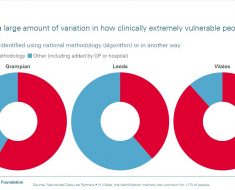Type 2 diabetes can be a 'devastating diagnosis' says expert
We use your sign-up to provide content in ways you’ve consented to and to improve our understanding of you. This may include adverts from us and 3rd parties based on our understanding. You can unsubscribe at any time. More info
Diabetes occurs when the body becomes desensitised to insulin, or production of the hormone ceases altogether. The result of this is high concentrations of glucose in the blood, which can be hugely damaging to the body if left unmanaged. Fortunately, the inclusion of certain foods in our diet could significantly lower our risk of the condition. In one study, a popular breakfast item was shown to slash the risk of diabetes by 40 percent.
In one 2018 study, published in the journal Nutrition Research and Practice, researchers established that the regular consumption of eggs could improve fasting blood glucose in people with pre-diabetes or type 2 diabetes.
The researchers found that eating one egg per day was enough to reduce the risk of the condition.
During the 14-year follow-up study of 7,002 Korean adults, researchers found that adults who frequently ate two or less than four servings of eggs per week had a 40 percent lower risk of diabetes.
The researchers noted: “During the 14-year follow up period, 857 subjects developed type 2 diabetes.
READ MORE: Diabetes type 2: The red juice that ‘significantly’ reduces blood sugar – drink ‘daily’

“In men, frequent eggs intake was associated with a 40 percent lower risk of developing type 2 diabetes than infrequent intake.
“[…] No association between Jeff intake and incidence of type 2 diabetes was observed in women.
“There was no association between cholesterol intake and risk of incident type 2 diabetes in either men or women.”
In a similar study published in the journal Food and Function, also in 2018, researchers looked at a sample of 42 adults who were either overweight or obese and were diagnosed with either pre-diabetes or type 2 diabetes.
Their findings showed that eating one large egg per day led to a significant 4.4 percent reduction in fasting blood sugar, as well as improvements in insulin, compared with an egg substitute.
The researchers concluded: “Daily consumption of one large egg may reduce the risk of diabetes without having any adverse effects on lipid profiles in individuals with pre-and type 2 diabetes.”
However, both sets of findings stand in stark contrast with earlier research cited on the Diabetes UK website, which dates back to 2008.

On this earlier occasion, the researchers had found that eating an egg every day increased the overall risk of Type 2 diabetes by about 60 percent.
The conclusions stemmed from a 20-year study that tracked almost 57,000 men and women.
For women, the risk increased by 77 percent, while eating just one egg a week did not carry an increased risk.
The health body Diabetes UK commented: “Diabetes UK recommends that in order to reduce their risk of developing type 2 diabetes, people should follow a healthy balanced diet, low in fat, salt and sugar but high in fruits and vegetables.

“It is more important to look at the overall diet rather than focusing on one specific food as was done in this particular study.
“More research would be needed if eating eggs regularly actually plays a definite role in the development of type 2 diabetes.”
Other simple dietary tips such as swapping out simple carbohydrates for whole grain, and sugary drinks for water, are important for avoiding diabetes.
Regular exercise may also help regulate blood sugar levels for a period of up to 48 hours.
Source: Read Full Article





